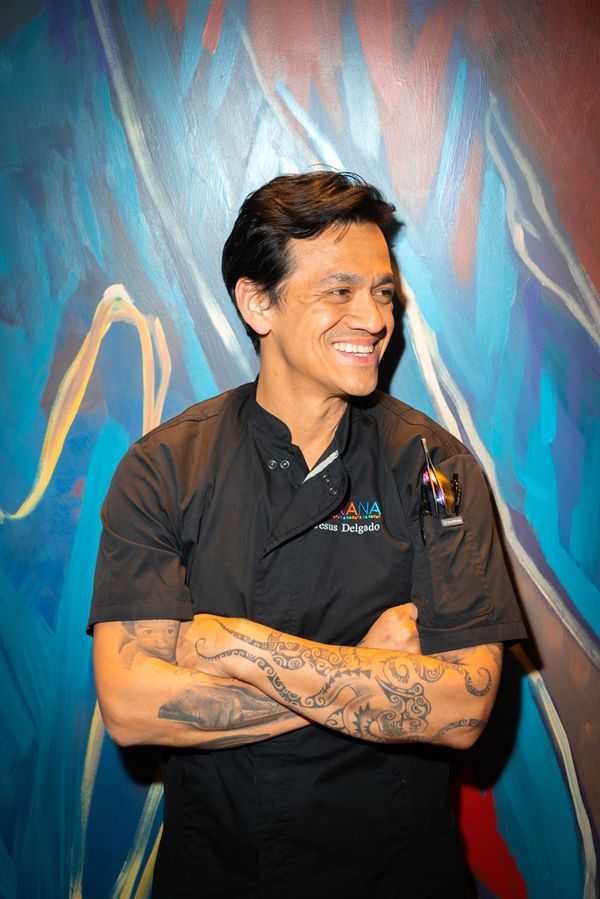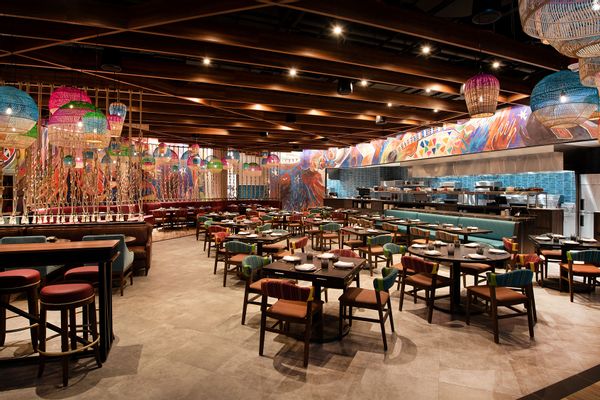
Peruvian food is such a diverse, unique cuisine, encompassing everything from lomo saltado (stir-fried beef with onion, tomatoes and French fries), antichucos (skewered and grilled meats) and quinoa to aji de gallina (a chicken dish with peppers and a creamy sauce) and papas a la huancaina (boiled potatoes with a creamy cheese sauce.) Peruvian food often uses "everyday" ingredients in unusual manners; Food critic Eric Asimov once said it was one of the world's most important cuisines..
Of course, though, we can't discuss Peruvian food without acknowledging the legendary ceviche, which is the country's national dish, as well as its trademark, cherished leche de tigre — a delicious, refreshing nectar highly prized in Peruvian cuisine.
A deeply flavorful, generally raw (and oftentimes very, very healthy) blend of fish, acid, fruits, vegetables, seeds or nuts — plus the requisite, aforementioned leche de tigre — ceviche is often a starter or appetizer, but its bright, intoxicatingly refreshing flavor often resonates throughout the entire meal. Of course, raw fish is made in so many preparations throughout cultures, but there is something about ceviche especially that has a certain je ne se quois.
This coming Wednesday, June 28th, is National Ceviche Day, so in order to properly celebrate the day, I reached out to Chef Jesus Delgado, the executive chef at Jarana in the American Dream Mall in East Rutherford, New Jersey. We spoke about ceviche Peruvian food at large, the future of Jarana — and of course — everything ceviche.

How did ceviche originate? What is its history?
History says that ceviche originated in the pre-Inca civilization "the Moches" in the north of Lima. It was originally made with the fermented citrus juice of the "Tumbo", which is a cousin of passion fruit. Later the Incas began marinating the fish with "Chicha" which is a ferment from the corn. When the Spanish brought limes, we switched to that and that's when the new Cebiche was born.
What exactly is leche de tigre?
Leche de tigre is the leftover liquid that we obtain after we marinate all the components of the cebiche (lime, fish, onions, celery, garlic, chilis, cilantro). It becomes a citrus marinade well known as a "Peruvian hangover cure".
What is your favorite type of ceviche?
Conchas negras cebiche (blood clams) . . . "Conchas Negras" is a clam that grows in the "manglares de Tumbes" (mangroves), where the [Tumbes] river meets the Pacific Ocean in the North of Peru. For me, this is the most exotic cebiche.
It is considered an energy booster, kind of an aphrodisiac due to the high level of zinc. Traditionally, it is prepared with chopped onions, fresh lime juice, a good amount of garlic and cilantro and rocoto chili pepper served with Cancha (sun dried fried corn) and choclo. Perfect enjoyed with a cold beer!
Ceviche is perfect for summertime. How is it generally prepared?
Cebiche is perfect for anytime, but it's best if you enjoy it in front of the ocean with a cold beer or refreshing chilcano, prepared a la minute with the freshest fish you can find, just briefly marinated with lime and seasoning. The most classic version is made with lime, garlic, aji limo, cilantro, onions, garnished with sweet potato, choclo (Peruvian corn) and cancha (toasted corn).
What are your tips for making ceviche at home?
Just get the freshest fish you can and have fun with the rest! Also, here are some other tips:
- Use a sharpened knife to cut the fish (very important!)
- Squeeze the limes by hand and not all the way: We just want the first drops, as the rest is bitter.
- Use a glass bowl or stainless steel to prepare: Cold is better.
- While mixing, stir delicately: You don't want to break the fish's flesh.
- Chop the cilantro and chili right before use! You want all the fresh oils and scents.
Beyond ceviche, what are some of your favorite Peruvian dishes?
Arroz con mariscos, pollo a la brasa, seco de carne, chaufa con chijaukay
What is your favorite item on the menu?
I love to start with a classic Pisco Sour and aji de gallina croquetas, followed by el Churrasquito chifero, which is a veggie fried rice with grilled beef tenderloin, fried plantain and egg, spicy sauce and pickled veggies paired with a nice glass of pinot noir.

What are you most passionate about as a chef, both within Peruvian cuisine and in general?
My job allows me to show my culture to others and — most of the time — make customers smile. Watching those expressions at the table, that's a priceless moment.
I love the format/design of the menu with the glossary! How was that conceived? I think that many menus could benefit from something like that.
I think our responsibility is not just to cook for others — our mission is to share Peruvian culture and that includes teaching sometimes, something we want to embody especially a Jarana.
What would you like to see next for Jarana — and Peruvian food in general?
I want to see Jarana all over the US and to expose more people to Peruvian cuisine.
Learn more about Jarana and see their inventive menu here!







